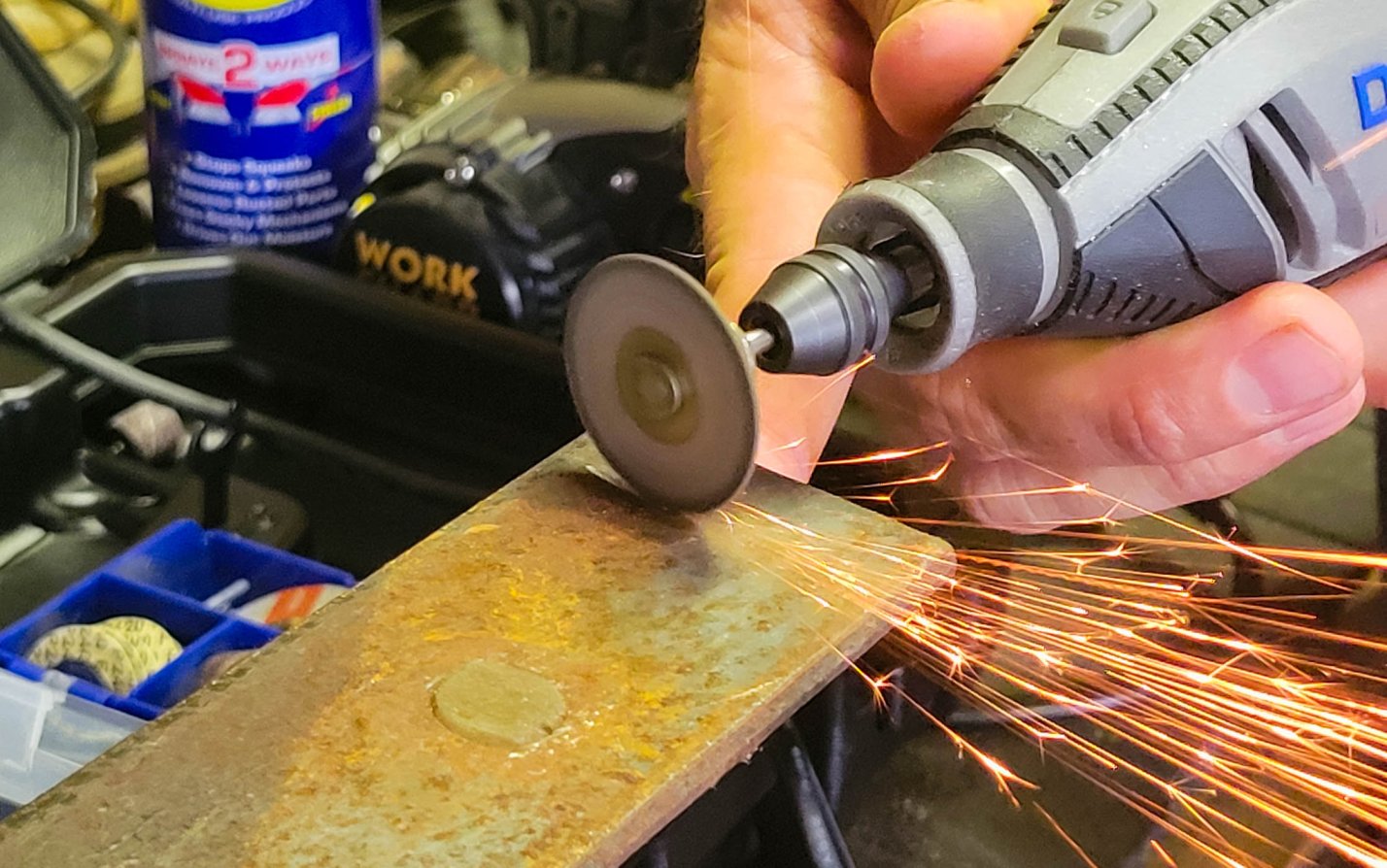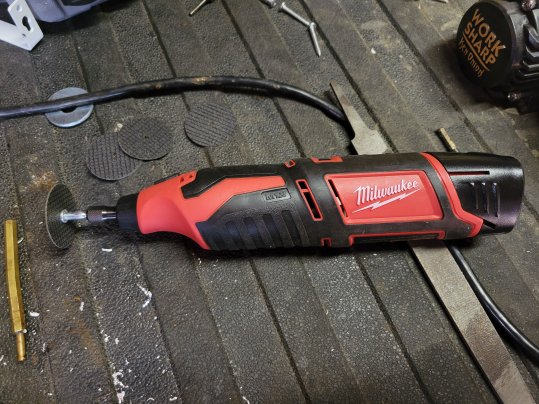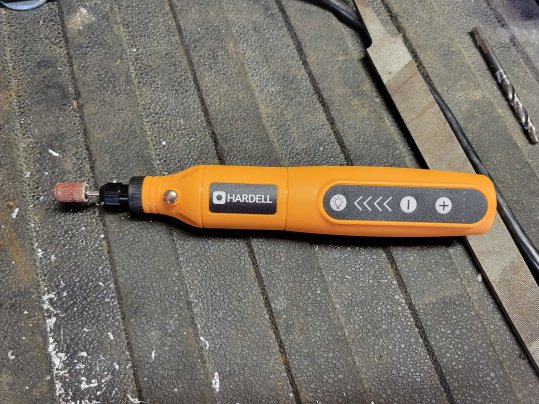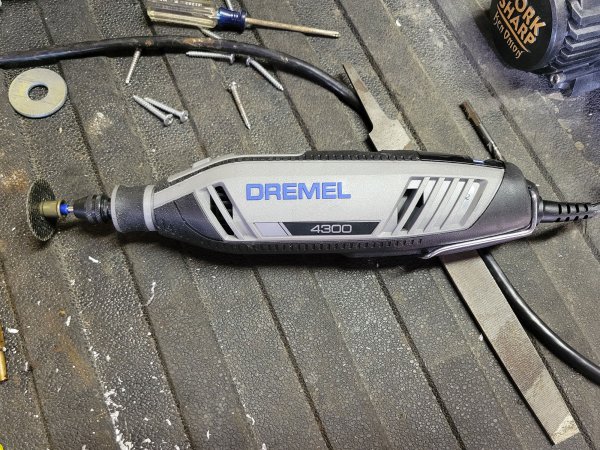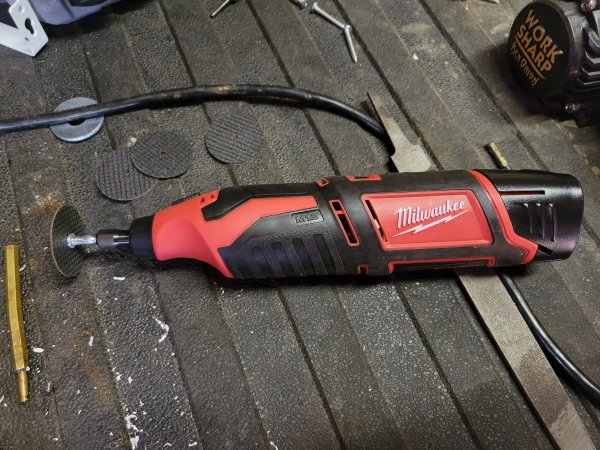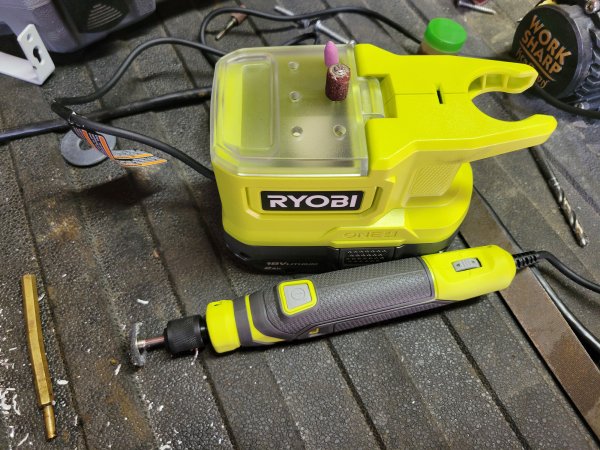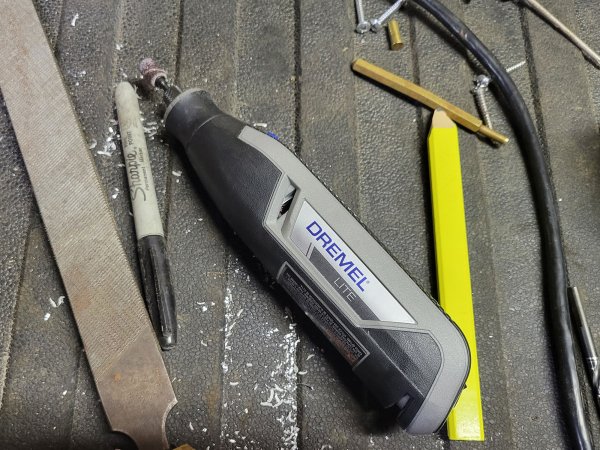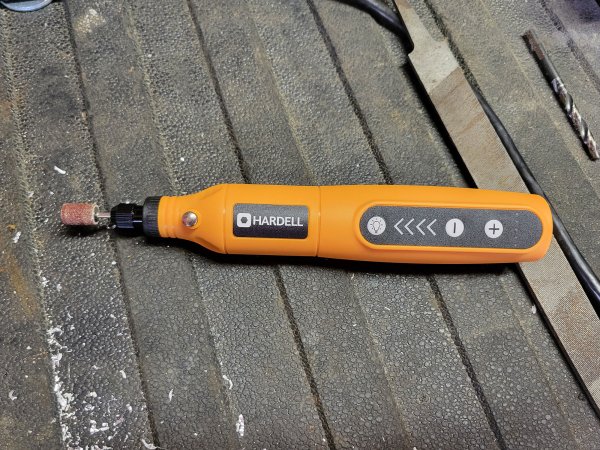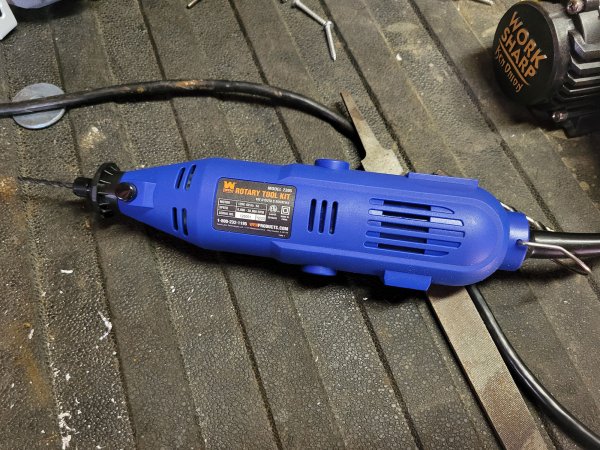We may earn revenue from the products available on this page and participate in affiliate programs. Learn More ›
Rotary tools are incredibly versatile and well suited to a wide range of tasks around the house, in the garage, and in the workshop. With the cordless models, you can even bring these into the field.
My grandfather was always tinkering with his motorcycles and making his own parts … luggage racks, windscreen mounts, heated grips, switch plates for heated vests, and anything else that would help him ride longer or in bad conditions. Watching him work was my first introduction to rotary tools. He had a Dremel, and it seemed to be able to do nearly everything he needed. I was impressed, and immediately wanted one.
That was a long time ago, and I’ve had more than a few rotary tools since then. I have used them for everything from polishing the action on a rifle and inletting a stock to making parts for my motorcycle, carving wood and stone, and polishing jewelry that lost its luster. Recently though, I put a bunch of the best rotary tools to the test to see how they stacked up against each other. There are far too many brands to test them all, but this test includes four plug-in and four battery models to help you find the best rotary tool for you.
- Best Overall: Dremel 4300
- Most Powerful Cordless Rotary Tool: Milwaukee M12 2460-20
- Biggest Included Accessory Kit: Goxawee G4007
- Most Innovative Cordless Tool: Ryobi PRT100 One+ 18V
- Best Every-Man Rotary Tool: Dremel 3000
- Best Rotary Tool for Light-Duty Work: Dremel Lite 7760
- Best Value Cordless Buy: HARDELL Mini Cordless Rotary Tool
- Bargain Basement Buy: WEN 2305 Corded Rotary Tool
How We Tested Rotary Tools
In order to see how these tools performed, I used them just as I would in everyday life. Testing included each tool taking a turn cleaning up a rusty chunk of angle iron down to bare metal with the same sanding drum. Each tool also drilled metal and wood, engraved, and used cutting discs to cut metal. Some of the lighter tasks included wood carving and shaping, polishing some old knives, retrofitting an aluminum picatinny rail to go on the forend of a rifle, and various other small tasks. Using the tools like this allowed me to see which worked best for smaller detail work, which were best for bigger tasks, which tools had power to spare, and which ones ran out of juice first. I took into consideration comfort for extended use, as well as vibration, RPM adjustability, noise, and overall quality.
Best Rotary Tools: Reviews & Recommendations
Best Overall: Dremel 4300
Pros
- Most powerful tool tested
- Versatile: 5 attachments and 40 accessories included
- High RPM range
- Functional and protective case included
Cons
- Heavy/bulky for fine tasks and very tight places
Key Features
- RPM range: 5,000-35,000
- Power: 1.8 amps
- Chuck/Collet: Universal and toolless
- Brushes: Replaceable, extras included
- Price: $100 (most common accessory kit)
- Two year limited warranty
Dremel is the big name in the rotary tool world, and their 4300 is their flagship. The Dremel 4300 was the most capable tool I tested, and would be my personal pick if I could only have one. It comes with just about everything you could need in a rotary tool, including attachments to turn this into a router or chainsaw sharpener, plus attachments to light up the work area, guard your eyes, and more. The 1.8amp motor can reach a higher RPM than the other tools, and can take more pressure before it bogs out.
If you’re looking for a rotary tool that can handle the heavier tasks, the Dremel 4300 is the one to get. This thing powered through rock carving with a diamond bit and hardly slowed the RPM. It handled the cut-off wheels better than all the rest, and removed rust faster than all the others. The only place this tool struggled was when I used it for small, very detailed tasks. The powerful motor means extra weight, and this tool was harder to finesse than smaller, lighter tools. It got the job done, but it took more effort because of the extra weight and size.
Most Powerful Cordless Rotary Tool: Milwaukee M12 2460-20
Pros
- Most powerful cordless tool
- Part of Milwaukee M12 series with interchangeable batteries
- Highest RPM range
- Very smooth motor with rheostat adjustment for infinite settings
Cons
- Heavy/bulky for fine tasks
- Most expensive tool if you don’t already use other M12 tools
Key Features
- RPM range: 5,000-37,000
- Power: 12V
- Chuck/Collet: 1/8’’ and Toolless
- Brushless design
- Price: $80-90 for tool ONLY, $150-175 With battery and charger
The Milwaukee 2460 had more power than the other cordless rotary tools in the test, and also boasts the highest RPM of any tool tested. It could withstand much more force than the others before it auto-stopped for protection. This was the best cordless rotary tool for using cut off wheels and for sanding or metal shaping. For those tasks, power is king, and the 2460 had considerably more than the other cordless models tested. However, for fine tasks like polishing and detail carving, the extra weight of a powerful motor and bigger battery made this harder to control, and more fatiguing.
Speaking of batteries, the regular batteries are 3.0Ah, but there are larger ones available up to 5.0Ah, which means this tool has great battery life, even with the extra power. The big power and big batteries do come with a big price tag though — over $150 if you want a single battery and charger. Even if you already have other M12 batteries and tools, the Milwaukee will still run close to $100 after tax, and you only get a few cut off wheels with it. But, if you need a cordless tool, and need plenty of power, you can’t beat the Milwaukee 2460-20.
Biggest Included Accessory Kit: Goxawee G4007
Pros
- Tons of accessories
- Flex shaft for a tight spots and a “light touch” included
- Molded plastic case
Cons
- RPM range limited compared to others
- Many accessories, not necessarily high quality accessories
Key Features
- RPM range: 8,000-30,000
- Power: 1.3 amps
- Chuck/Collet: Universal and Toolless
- Brushes: Replaceable, extra set included
- Price: $40
The Goxawee G4007 comes with a flex shaft, router attachment, eye guard, and a 140-piece accessory kit that includes drills, router bits, stones, sanders, polishing wheels, cutoff discs, diamond bits, and more. And as long as those jobs aren’t too heavy duty, this tool should handle them well. I found that some of the accessories, like the sanding drums and polishing wheels, did very well, but others, like the small cut off wheels, were not so good.
You get a very healthy supply of the small cutting wheels, perhaps because they know it’s not too hard to break them while cutting. The tool itself functioned fine, even though the RPM range was limited. I didn’t experience much vibration or noise. For the price, it seems like a pretty solid buy. If you’re looking for a tool to stand up to heavier use, the motor is middle of the pack power wise, and you might find that tasks take longer because it bogs down under pressure. If you’re looking for a decent tool with lots of included accessories, the Goxawee gets it done for a very reasonable price.
Most Innovative Cordless Tool: Ryobi PRT100 One+ 18V
Pros
- Battery and charger included
- Lightweight motor makes fine work easier
- Built in tool holder and accessory storage
- Compatible with any Ryobi One+ 18V batteries
Cons
- More vibration than others at high RPM
- Limited top end RPM
Key Features
- RPM range: 4,400-23,000
- Power: 2.0Ah
- Chuck/Collet: 1/8” and Toolless
- Brushless
- Price: $55
The Ryobi PRT100 tool is unlike all the other cordless tools in the test. It’s a light and nimble motor with a light cord that connects to the battery, which serves as a holder for accessories and a stand for the tool when it’s not in use.
I really liked the design of the Ryobi PRT100. The battery sits flat, and the part that plugs into it has a container for accessories, and the lid has places to stick your most used bits. There is also a built-in stand to set the tool in when it’s not in use. The collet is easy to use for fast bit changes, and the tool is very light in hand because the battery is separate, which makes it one of the best for finer polishing and cleaning work.
I also liked it for detailed carving. The tool has good battery life and a large battery and wall charger are included, all for considerably less money than the Milwaukee tool-only price. All that said, the Ryobi had the most vibration of any of the tools. When you are operating near the upper end of the RPM range, it’s actually pretty annoying. It may have just been my model, but I found myself staying in the first three settings where the vibration wasn’t as noticeable. Overall, the Ryobi PRT100 is a good tool, with a great design.
Best Every-Man Rotary Tool: Dremel 3000
Pros
- Commonly used accessories included
- Fairly light and easy to control
- High RPM range
- Functional and protective case included
Cons
- More expensive than other brands with similar features
Key Features
- RPM range: 5,000-35,000
- Power: 1.2 amps
- Chuck/Collet: 1/32”-1/8” and Toolless
- Brushes: Replaceable, extras included
- Price: $64 (most common accessory kit)
The Dremel 3000 has the same speeds as its bigger brother, but with a little less juice behind it. It’s everything that most users will ever need, and nothing they don’t. Dremel makes quality tools, and while I’m skeptical of some of the specs posted by other brands, Dremel lives up to what it says. The 3000 took everything I threw at it, just like the more powerful 4300, but it took just a little longer for heavy jobs.
However, when it comes to finer tasks, the lighter weight and butter smooth motor made the 3000 very easy to work with. For engraving, polishing, cleaning, carving and crafting, the Dremel 3000 was excellent. If Goldilocks were to pick rotary tools, she’d go with the 3000 — not too powerful, not too weak, not too heavy, not too light. It was just right for 95 percent of what I wanted it to do. Yes, you will pay more for a Dremel than most other brands, but yes, this is a higher quality tool than most others. For most people, the Dremel 3000 will get the job done, and you can expand its versatility with other accessories and attachments if needed.
Best Rotary Tool for Light-Duty Work: Dremel Lite 7760
Pros
- Easy to control for detail work
- USB Rechargeable
- Lightweight
- 24 accessories included
Cons
- Lite mean lightweight and light duty
Key Features
- RPM range: 8,000-25,000
- Power: 2.0Ah
- Chuck/Collet: 1/32”-1/8” and Toolless
- Brushless Design
- Price: $50
The Dremel Lite lives up to its name weighing in at only 9.6oz, but still offering a 2.0Ah battery for extended use between charging. Notably the Dremel Lite 7760 has an incredibly smooth motor at all RPM settings, and is easy to use for extended periods of time on detailed work. Polishing and light carving are a breeze with this tool, and I was impressed with the battery life. It has the good quality that you expect from a Dremel, and will accept other accessories and attachments from Dremel and other brands. If you are looking for a lightweight, reliable, quality cordless rotary tool, the Dremel Lite might be perfect for you. I say might because if you also want big power, this is not a good choice.
There is a red light near the back of the tool that lights when the battery is getting low, but also lights if you’re putting too much pressure on the tool and it’s getting ready to shut off to protect itself. The power is ample for light work, but this isn’t what I would choose for cutting through thicker metal or grinding heavy rust. It just isn’t designed for it. But, if you are mainly using this for crafts and polishing and jewelry making, The Dremel Lite is a great pick.
Best Value Cordless Buy: HARDELL Mini Cordless Rotary Tool
Pros
- Only $20
- Over 60 accessories included
- Built in light to see projects better
- Portable carry case included
Cons
- USB-C charging cable, but no wall adapter included
Key Features
- RPM range: 5,000-18,000
- Power: 2.0Ah
- Chuck/Collet: 1/16”-1/8” and Toolless
- Brushless
- Price: $20
The HARDELL Mini Rotary Tool is the smallest and lightest tool in the test, and it is also tied for the least expensive. The little HARDELL has the least intuitive speed controls, and you have to cycle through the speeds to turn it off. But outside of that, it functions very well. The motor is quiet and smooth, and it has more power than you would expect from its small size. Most of the accessories come in the form of extra sanding drums, which is nice because I use them fairly often.
The compact travel case would make this a great option to bring along as a “just-in-case” tool. This tool works well for fine tasks because it’s so small and light, but that small size means that it can’t interchange attachments like the others can. The HARDELL won’t accept any guide adapters, and so it will always be used free hand. All that said, I was impressed with the power and accessories out of this mini rotary tool, and I’m going to have it as part of the tool kit I always carry in my truck. USB charging means I can always maintain the battery, and the carry case is easy to put in my tool bag. The HARDELL Mini may be the best value tool I tested.
Bargain Basement Buy: WEN 2305 Corded Rotary Tool
Pros
- Under $20!
- Flex Shaft Included
- Protective case included
Cons
- It’s inexpensive, and also cheap
- RPM ratings seem exaggerated
Key Features
- RPM range: 8,000-30,000
- Power: 1.0 Amps
- Chuck/Collet: 1/32”-1/8” and Toolless
- Brushes: Replaceable, no extras
- Price: $19
The WEN 2305 is impressive when you open it up and see everything you get for under $20. And, the reality is, if you aren’t planning on using this constantly, it will probably hold up OK. But, that’s not to say that this feels or works like a more expensive tool. When you turn it on, you immediately get the “old tool” smell from the motor, even though it’s brand new. To save money, companies are going to use cheap brushes and windings, and you’re going to get that smell.
After that, you look closer and see the accessories are just piled in a little container, and they don’t feel too great. Then you rev it all the way up and realize that the 30,000 RPM it advertises seems very optimistic on their part. Finally, you begin to use it. Not super-fast or powerful, but it gets the job done. For lighter use, I think this tool would hold up fairly well, but that smell gets worse when you start to push it at all. If you are on a shoestring budget, or just need a tool for one project and don’t want to spend too much, the WEN 2305 might be the tool for you.
How to Choose A Rotary Tool
Power Source
The first consideration when choosing a rotary tool should be whether it has a cord, or if it’s battery powered. Corded tools tend to be more powerful than the cordless and are usually a little bit larger in hand. There are always exceptions, and the Milwaukee is one of them. It’s battery powered, but it is the largest and heaviest tool, and is more powerful than many of the corded models. If you will be using your rotary tool in an area where there are no close plugs, or just don’t want to be tethered by one, then a battery powered tool is a great option. However, if you will be using it for more heavy duty work, or for long durations, the extra power and unlimited supply of a corded model will probably work best for you.
Intended Use
Decide what your most common tasks will be, and choose your tool based on that. If you have a very wide range of tasks to do, your best option may be to get two tools, or choose one that can do them all, even if it’s overkill for the smaller stuff. I think the two-tool option is the way to go if you have the funds. The Dremel 4300 and the HARDELL Mini would cover everything from the heaviest jobs down to the smallest.
The smaller HARDELL Mini allows for the finest jobs and reaching tight spaces, and the big power and extra attachments of the Dremel 4300 can handle any major job that a rotary tool is suited for. If you’re mainly polishing jewelry and using it for crafts, a lightweight battery model will be great. And, if you’re mainly using a rotary tool in the garage for some metal fabrication and rust removal, then go for a more powerful corded model. If you want a general purpose tool for a fairly wide range of tasks, go for the more powerful higher-end battery models, or the middle of the road corded ones.
Budget
Rotary tools range in price from sub $20 all the way up to over $200. As a general rule, I try to spend as much as I can afford on tools because I want them to take care of me — I don’t want to take care of them. “Buy once, cry once” was instilled in me while I was an aircraft mechanic. However, there are some good tools out there for around $50 and under range, so even if things are tight, you can still get a tool worth having. If your budget is really tight, the WEN is a decent tool when you consider its under $20. If you are in the trades and make your living with tools, the Milwaukee and the Dremel 4300 are the most powerful and the most spendy, but they are also top quality.
Read Next: Best Cordless Drills of 2025
Rotary Tools FAQ
For the most part, no. Many tools come with collets that have a much wider adjustment range so they will accept most shanks. Some tools do come with an extra collet for either the largest or smallest shanks, but many come with a universal chuck or have one available. It makes bit swaps much easier and faster.
On some models, yes, on others, no. The Milwaukee and the Ryobi both have removeable batteries with external chargers. This means you can have as many batteries as you want and switch them out when one is going flat and put it on the charger. However, the Dremel Lite and the HARDELL Mini both have internal batteries that charge with a cord. So, when they die, you can’t use them until they recharge.
For the most part, yes. The only tool that won’t accept the screw-on attachments on the front of the tool is the HARDELL Mini. All the others have the same thread size. As for accessories, the models with a universal chuck or multiple collets will accept accessories from other brands. There are three common shank sizes and they will all take any brand as long as the shanks are the correct size.
Final Thoughts on the Best Rotary Tools
Rotary tools take on a wide variety of jobs, and the right one can make those jobs a lot faster and easier. I own a fleet of tools from past professions, but just about every job (at home or professionally) benefitted from having a rotary tool. They are a worthy investment whether you are a new DIY crafter, or an experienced tradesman.
- Best Overall: Dremel 4300
- Most Powerful Cordless Rotary Tool: Milwaukee M12 2460-20
- Biggest Included Accessory Kit: Goxawee G4007
- Most Innovative Cordless Tool: Ryobi PRT100 One+ 18V
- Best Every-Man Rotary Tool: Dremel 3000
- Best Rotary Tool for Light-Duty Work: Dremel Lite 7760
- Best Value Cordless Buy: HARDELL Mini Cordless Rotary Tool
- Bargain Basement Buy: WEN 2305 Corded Rotary Tool
